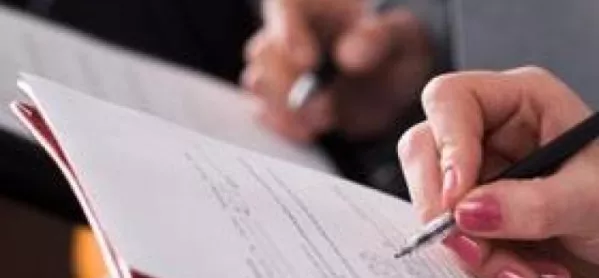Ofqual’s algorithm issues ‘more severe’ at GCSE level
Share
Ofqual’s algorithm issues ‘more severe’ at GCSE level
Ofqual’s under-fire grading process will determine the overwhelming majority of GCSE grades awarded this Thursday, new analysis shows.
The exam regulator’s system has already proven controversial, with A-level students reporting downgraded results because of their school’s historic performance, leaving them in limbo as they try to appeal grades and secure university places.
And yesterday, the exams regulator published new information on an appeals process based on “valid mock results” and students’ coursework, only to withdraw it hours later on Saturday night.
News: A-level ‘chaos’ deepens as Ofqual suspends appeal rules
Exclusive: Teacher grades ignored in most GCSE results
A levels 2020:
- Record percentage get top A* grade
- Science entries in decline
- Maths and English show signs of recovery
Despite this, the same issues are set to rear their head on GCSE results day - but with a much higher proportion of students affected, as reported by Tes earlier this month.
Research by social mobility charity upReach, as reported in The Guardian, found that 4.6 million GCSE grades - around 97 per cent of the total - will be awarded through statistical modelling. This includes teacher ranking of pupils, but not teachers’ assessment of individual pupils’ grades had they sat the exams.
Natalie Perera, executive director of the Education Policy Institute, said: ”“We will almost certainly see a repeat of the many problems seen with A levels, only with GCSEs they could be more severe.”
“A larger year group, combined with the fact that GCSE grades are often harder to predict, will mean that Ofqual could place even greater emphasis on its standardisation model,” she said.
“There is a real risk that even more grades will be pushed down as a result.”
Headteachers fear that GCSE results’ day will see more pupils downgraded by the algorithm, as the model allows for subject entries of 5 pupils or fewer to keep their teacher-assessed grades, while for entries of between five and 15 pupils, teacher-assessed grading was factored into part of the calculation process.
For subject entries with more than 15 pupils, only Ofqual’s statistical modelling has been used - which is based on teachers’ rank order of pupils, the school’s historic performance in exams and pupils’ prior attainment.
As subject entries are larger at GCSE, this means the majority of grades will be calculated by the algorithm - 97 per cent at GCSE compared with an estimated 82 per cent of all A-level grades.
John Craven, chief executive of upReach, told The Guardian that this could also disproportionately benefit private school students.
“Last year, GCSE grades at independent schools averaged 1.5 grades higher than at state schools and showed much less variation,” he said.
“This statistically further reduces the likelihood of a private school student being downgraded. Put simply, fewer students are at risk of being downgraded when the historical grades at their school are mostly higher grades and there is little variation in the grades awarded.”
upReach’s study estimates that at least 11 per cent of private school grades will take teacher-assessed grading into account, while this will only be accounted for in 1.4 per cent of state-school grades.
“A typical private school student is going to get at least one grade which is based on their teacher’s assessment,” he said.
“Ofqual is saying teachers’ assessments have been overoptimistic. If this is the case for GCSEs too, private school pupils will be advantaged with their GCSE results in exactly the same way they have at A-levels.”
At A level, private schools saw their share of A and A* grades rise by 4.7 percentage points in 2020, more than double the rise for comprehensive schools, which was 2 percentage points.




